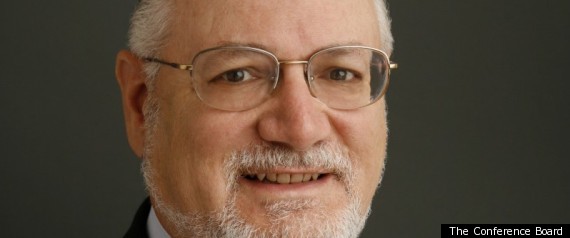 "The economy that we had before the recession is gone," said Kenneth Goldstein, economist at the Conference Board. "It's not coming back."
"The economy that we had before the recession is gone," said Kenneth Goldstein, economist at the Conference Board. "It's not coming back."The U.S. economy is transitioning to a new normal in which businesses invest less and consumers spend less than before the recession, Goldstein told The Huffington Post in an interview last week. As a result, he said, economic growth and job growth will be slower than before.
He said that businesses, consumers and the government would need to spend at least $1 trillion more than they are likely to spend in order for the economy to return to its pre-recession growth rate. But he added that no one is willing to spend the money necessary to jumpstart the economy, since the government is cutting spending, consumers are saving more, and businesses expect a lower return on their investments.
"Where's the money?" Goldstein asked.
The Conference Board, which counts half of all Fortune 500 companies among its members, provides economic and business advice and research to its member companies.
The main problem is that consumers' expectations for the future have plunged, Goldstein said. They suffered from such a large economic shock in 2008 and 2009 that many older people now do not expect to return to work, and many younger people no longer expect to make that much money, he continued. As a result, Americans have cut back on spending.
Consumers are indeed saving more than they did before the recession. They saved 3.7 percent of their incomes at the end of 2011, in contrast to less than 2 percent of their incomes during all of 2005, according to government statistics. Their wages, when accounting for inflation, actually fell in 2011.
Consumer confidence has been at recessionary levels for the past four years, according to the Conference Board's Consumer Confidence Index.
Like consumers, businesses are spending less because they have lowered their expectations of future income, Goldstein said. While businesses could expect returns of 8 to 12 percent on their investments before the recession, they are now expecting returns of about half that amount. If they raise prices too much, consumers will choose cheaper alternatives, he said.
Exports are one of the only bright spots sustaining U.S. economic growth at this slower pace, he added.
Now that people's homes are often worth less and credit is expensive, people are relying on their wages to be able to spend money -- and their wages have barely been growing, said Lynn Franco, director of the Conference Board's Consumer Research Center. She said this means that economic growth will be slower than it was before the recession for the foreseeable future, since consumer spending comprises two-thirds of the U.S. economy.
"If you just take a look at the fundamentals alone," she said, "you cannot get back to the levels of consumer spending that we had prior to the crisis."
Original Article
Source: Huff
Author: Bonnie Kavoussi
No comments:
Post a Comment